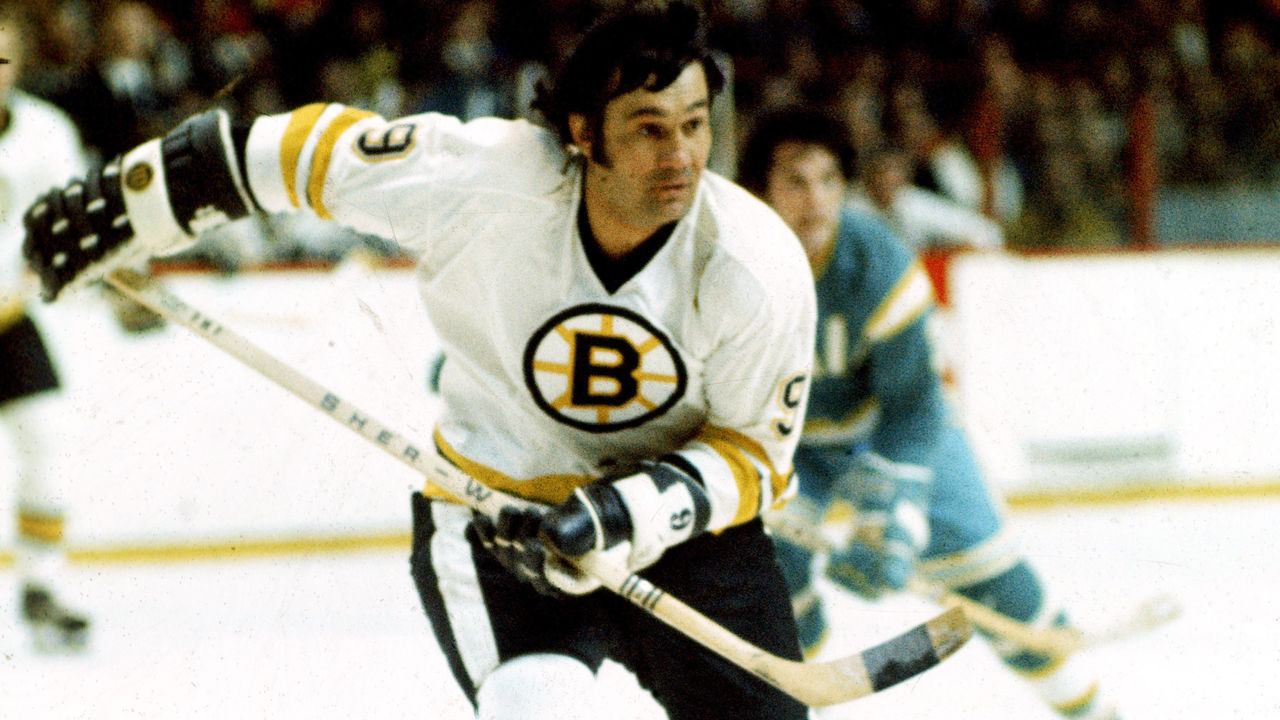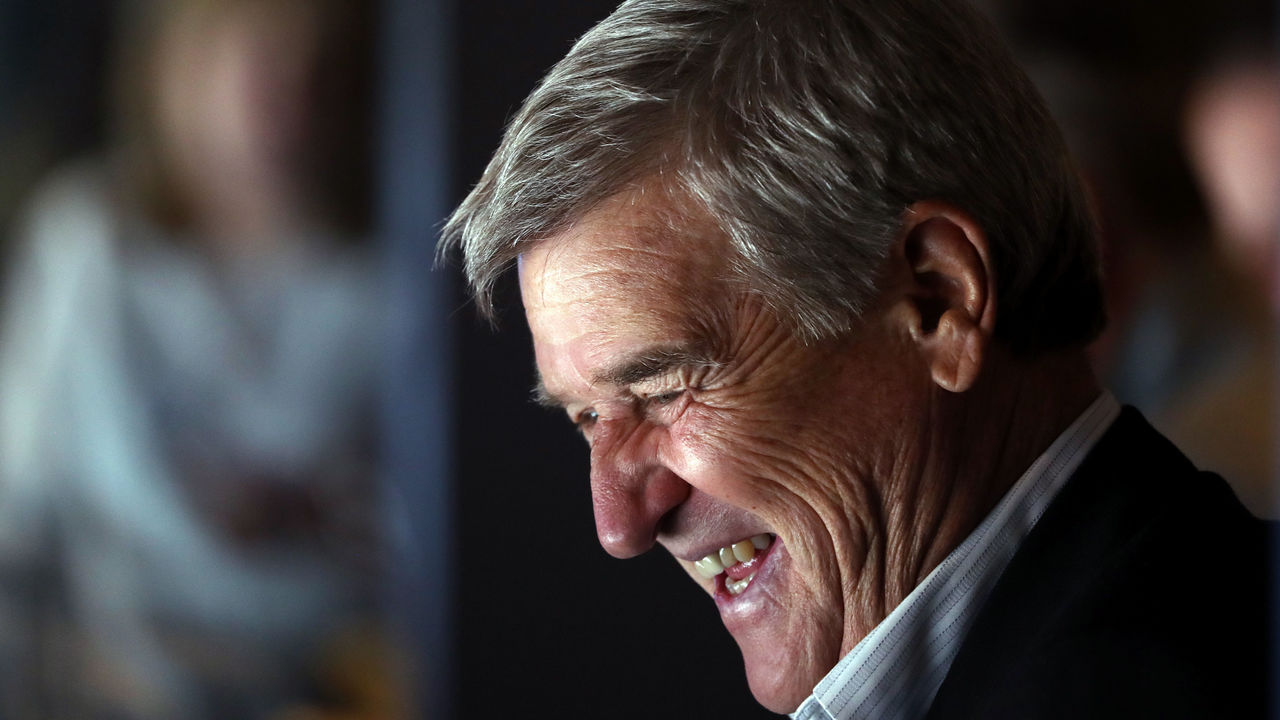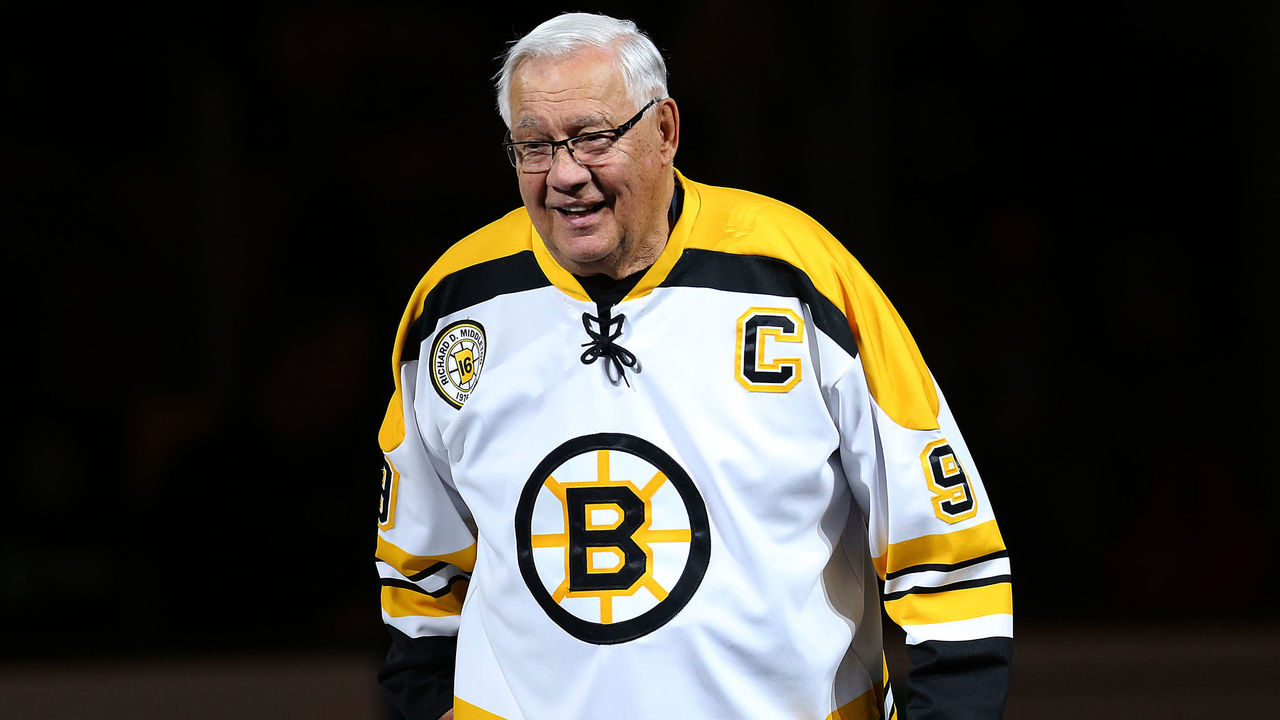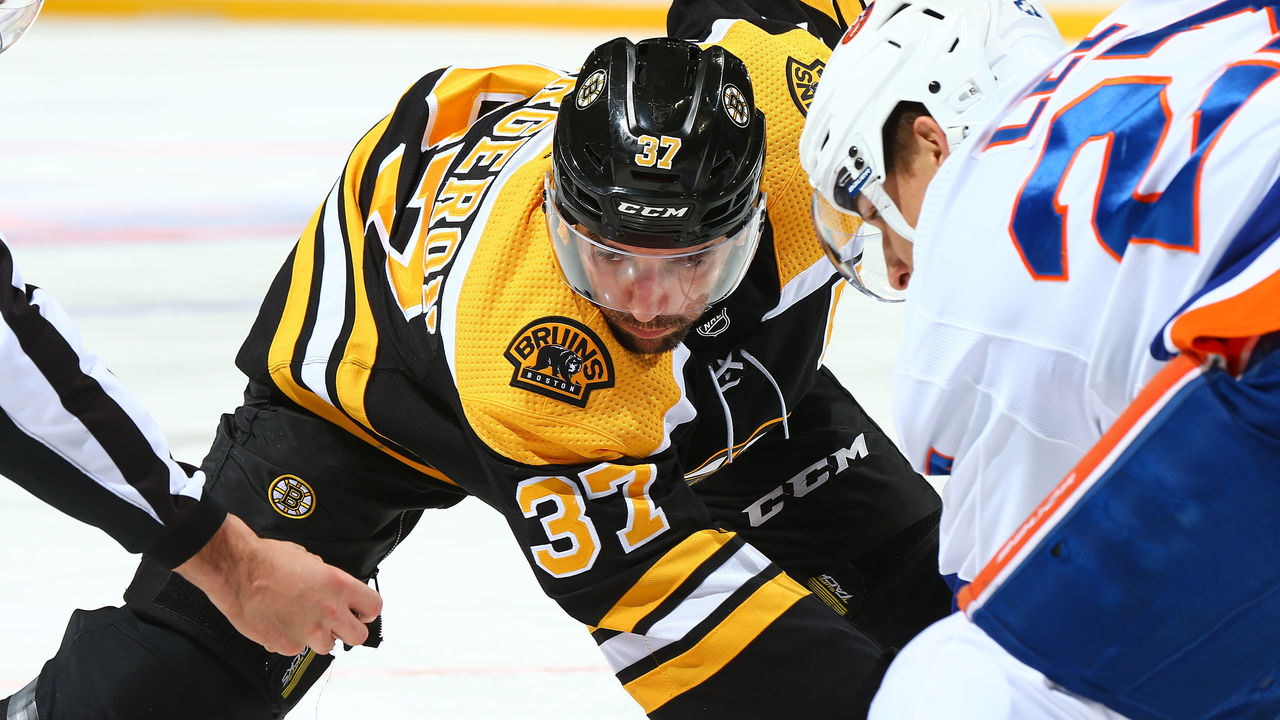Bobby, a trade, and crazed fans: Q&A with Bruins legend Johnny Bucyk
The 1969-70 Stanley Cup champion Boston Bruins were headlined by the transcendent Bobby Orr, ultimate wild card Derek Sanderson, all-time sniper Phil Esposito, and world-class goalie Gerry Cheevers. That foursome's average age was 25. An older guy named "Chief" balanced out the core.
Johnny Bucyk, a physical, goal-scoring 34-year-old forward who fully embraced his role as the unofficial captain, brought responsibility and maturity to a roster brimming with talent. His leadership extended beyond the rink, too.
"If you needed something, (Bucyk) was more than happy to make sure you got it," former teammate Brad Park once said. "If you needed a dishwasher, he'd tell you where to go."
"If you needed an elephant," former Bruins coach and GM Harry Sinden added, "John could get you an elephant somewhere in Boston."

This reputation of being selfless and levelheaded off the ice - plus two Cups, more than 1,500 games played, more than 500 goals scored, and two Lady Byng trophies - helped Bucyk earn his induction into the Hockey Hall of Fame in 1981, where he's now enshrined alongside Orr, Esposito, and Cheevers.
One particular goal among Buyck's 556 career tallies stands above the rest because it set the table for the most iconic photo in NHL history. Bucyk's late third-period goal in Game 4 of the 1970 Cup final against the St. Louis Blues extended the game so Orr could fly through the air early in overtime.
"It was the big goal to put it into overtime," Bucyk said in a recent interview. "We were up 3-0 in the series. Then, of course, Bobby scored the biggest goal of all. It was nice to win the Stanley Cup for the first time. That was a big plus for me, being part of the team."
Sunday marks 50 years since Orr's goal. To commemorate the occasion, NHL Network Originals produced a one-hour documentary about the 1969-70 Bruins. "Big, Bad & Bobby" debuts Sunday at 8 p.m. ET on NHL Network (U.S.) and Sportsnet (Canada).
Ahead of the debut, Bucyk, now 84 and living in Boxford, Massachusetts, with his wife Terri, chatted with theScore about a number of Bruins-related topics.
Do you have the picture of Bobby hanging up somewhere in your house?
Oh yeah. We've got all kinds of pictures hanging around. I've got that one of him flying through the air. I mean, it was a big night, a big goal, and a big thing. We finally won the Stanley Cup after 29 years.
What had you heard about Bobby before he arrived in Boston in 1966? That was your 12th year in the NHL and 10th with the Bruins.
I watched him in junior and you saw the talent that he had and the way he played. Then, when he came to us, I happened to be his roommate. They put Bobby with me. We got along so well. Very close friends, as we still are. But you knew things were going to change with him back there. When he was on the ice, it was like playing on a power play. Six on five.
Would you ever catch yourself daydreaming as he skated coast to coast?
(Laughs) I just kept saying to myself, 'Oh, we're going to win the Cup, we're going to win the Cup, we're going to ... ' He made the biggest difference.

Where do you stand on the greatest-of-all-time debate? Bobby? Wayne?
Ah, it's too hard to compare. You're talking about two players from two different positions. Both very talented, both exciting to watch. I don't grade them, I don't grade anybody in the league, because everybody is different. They were two of the best, though. Gretzky was such an offensive player. Bobby was both - offensive and defensive. I just couldn't compare them. It's so tough to do. Even now, with so many great players, who are you going to pick? The way the league is now, every team has some good, All-Star players. And a lot of these kids now are going to be great. Nothing you can do.
You don't hear about Bobby's defense very often. Everyone remembers the skating and point totals. Is defense an underrated part of his game?
If Bobby was caught up ice, he'd be back before you knew it. He could always, always get back into the play. He was such a good skater, and went at such fast speeds. He could just accelerate real quick and he had so much talent. And it was too bad. He played hurt a lot of the time, and that's what shortened his career. He should have been playing for many more years. But that was Bobby. Bobby knew he was better than what we had, so he wanted to play, hurt or not. He was out there, no matter what, and doing his best.
Do you feel like those playoff runs in 1967-68 and 1968-69 were necessary experiences, essential building blocks to winning the Cup in 1969-70? (The Bruins had missed the playoffs for eight straight seasons prior to 1967.)
It was a big plus. It gave you a lot of confidence. You're up there, you have a chance to win. You're all the way, deep into the playoffs. And then you lose. But you knew you were close and you knew eventually it was going to change. And it did.
How important was the 1967 trade - where Esposito and a couple of other guys came to Boston - to the trajectory of those Bruins teams?
That trade was probably the biggest trade ever to help us. To get Espo, (Ken) Hodge, and Freddie Stanfield - three great players - was to get (most of) our power play, too. You couldn't believe it when that trade happened, and when Bobby came up and Derek (Sanderson) came up. You knew you were on your way to a Cup.
Many hockey fans today don't know anything about Derek Sanderson - on the ice or off it. He was quite the character, wasn't he?
He was a lot of fun. He kept you alive. He's funny. He was one of the best penalty killers we ever had. Him and Eddie Westfall made a good pair. They scored a lot of goals. What else can you say? He was quite competitive. He was a disturber out there, too. He had all the other teams upset.

The Bruins weren't very good at the beginning of your career. Did you ever think to yourself, "Oh man, I'm not going to win a Cup here?"
No, I loved Boston, I loved playing here, I loved the fans, and we were competitive a lot of the time. We had some great years. We did go a few years without even getting into the playoffs. That was a little tough, but I never thought about asking to be traded or hoped to be traded. I just wanted to play hockey and do it in Boston. Whoever knew my career would still be on? I'm still working for the Bruins. This is my 62nd year with the organization. That's exciting. How many people on any job can say they've been there over 60 years? I'm very thankful. Thankful to (ownership) for keeping me on.
You're in the documentary. What was it like to relive these old memories?
I've had a good career. I had 23 years as a player in the league. That's a lot of times to try to remember. You do remember your 500th goal. I remember the playoffs in St. Louis. In the opening game, I got a hat trick - that's something you don't forget. And then, of course, scoring the goal in the fourth game (of the Cup final) to put it into overtime with just about seven minutes left in the game, where they were leading us 3-2. I scored that one, tied it up, and then we won it in overtime. You try to remember the good times. As you get older, it gets tougher and tougher.
You guys were celebrities in Boston during this period. What did that look like on a daily basis? Did you have much privacy away from the rink?
It was tough. You didn't wear a helmet, so fans would recognize you real quick. They all wanted to say hello, get a picture, get an autograph. But that's part of it. When you choose this life, you've got to go through that. I had no problem with it. I loved to talk to the people. Sometimes I didn't want to talk to them, though (laughs). Especially when you've just lost and they want to know why. How the heck would I know? No, it was fun. I had a real good run, enjoyed it, and I still enjoy being part of the team. It's just too bad what's happening this year. I thought we had a real good chance to win the Cup.
How plugged into the current Bruins team are you? Who's your favorite player, and why?
I'm at every game at home. I don't travel, but I watch the road games on TV. I gave up traveling a few years ago because I had enough of it. I think I've probably missed three games in my life. I enjoy the game. It's fun. I'd have to say (Patrice) Bergeron and (Zdeno) Chara. They're two of my favorites. Both are very close friends. Just (Bergeron's) competitive nature. He works both ways on the ice. He's such a good, talented player who works hard every game.

Do you like today's game better than the game from your era?
It was different back then. The rules are different now. The equipment is different now. The sticks. The skates. We used to wear the same pair of skates for two or three years. Now, they use two or three pairs a year. There's just so many different things nowadays. They shoot the puck harder, and I'm sure faster. The players are better skaters, probably better than we were. Yeah, the game is still enjoyable to me. If you've got two teams who are going to go out and play hard and physical, bump and grind, and not do anything stupid like get stupid penalties, it's enjoyable. I don't like seeing all the chippiness. I like seeing good heart instead. And in Boston we've had a lot of (guys with good heart).
As things go, you remember some of the things you had. Even the years when I played, the rivalry we had with Montreal, you knew every game was going to be a battle. It was going to be a fight, it was going to be something. But I used to always say, if you had a bad game score-wise, liven it up with a fight. Somebody would get into a fight on the ice and the fans would go home happy.
How do you think you would fare if you were transported to this era and just starting your NHL career in 2020?
(Laughs) I know I'd be richer.
John Matisz is theScore's national hockey writer.